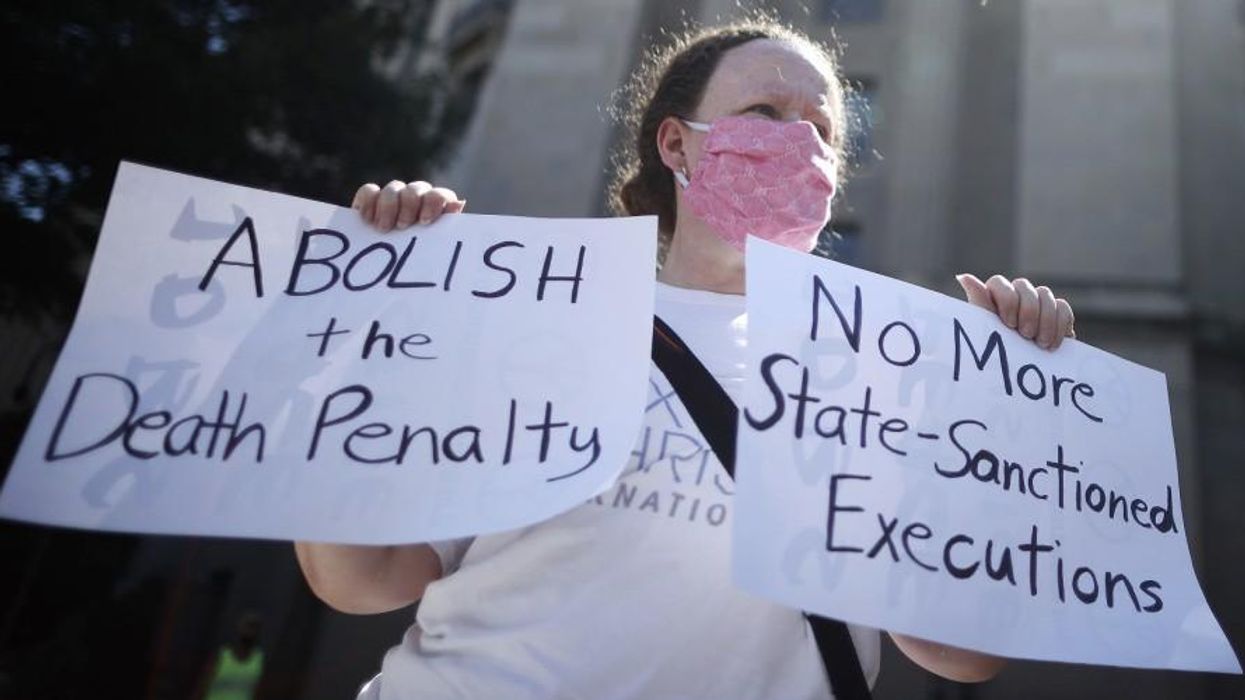After Harris' address, the Center for Gender & Refugee Studies (CGRS)
expressed agreement with her that "we need to build a fair, orderly, and humane immigration system," while also warning that her "proposed border policies would do the opposite."
"Banning asylum and punishing people seeking safety only causes more chaos and dysfunction at the border, and more refugee deaths," CGRS said. "We want real solutions to the humanitarian challenges at our border, too. But these policies of cruelty and exclusion fail us, every single time."
CGRS urged Harris to embrace the #WelcomeWithDignity Campaign's policy
solutions: restore access to asylum at the border; support existing systems and launch new ones to receive and integrate people seeking safety; create a more effective and timely immigration system; and strengthen refugee resettlement programs and other pathways to the United States.
During the speech and on social media, Harris emphasized combating drugs. She said: "As attorney general of California, I prosecuted transnational criminal organizations that trafficked guns, drugs, and human beings. I know the importance of safety and security, especially at our border. Today, I visited the U.S.-Mexico border and spoke with Customs and Border Protection officials about our progress to secure our border and disrupt the flow of illegal fentanyl into our nation."
She also took aim at her GOP opponent, former President Donald Trump, for his infamous family separation policy and for killing a bipartisan border bill. While the Republican attacked the legislation so he could
campaign on immigration and promise mass deportations, progressives in Congress and rights advocates opposed its "extreme and unworkable enforcement-only policies."
The Democratic nominee also vowed to strengthen asylum
restrictions that President Joe Biden imposed in June, which are being challenged in court by critics including the ACLU. The administration's policy change has been followed by a drop in border numbers but also "rampant rights violations," according to migrant rights groups.
Pushing back against Harris' framing that asylum-seekers simply need to go to legal entry points rather than crossing the border unlawfully, Christina Asencio, a research director at Human Rights First,
explained on Friday that the border bill would do what the June asylum ban has already done: suspend processing at ports of entry unless people obtain an appointment.
"Human Rights First has documented the life-threatening harm families with children and adults face in Mexico while forced to wait up to nine months for an appointment [through] an app that's only available in three languages," she added. "This is not a solution."
In a social media thread highlighting reports of agents "removing asylum-seekers who explicitly communicated their fear of return in violation of refugee law" since the introduction of Biden's ban, Robyn Barnard, an attorney with the group,
said:
Human Rights First and others have interviewed asylum-seekers who expressly requested asylum, relayed their past persecution, explained their asylum claims, showed agents their injuries, had anxiety attacks, sobbed, and begged to be heard, but were ignored.
Other families recounted that not only were they not asked whether they had a fear of return or why they came to the United States, they were not even allowed to speak.
Harris' pledge to toughen the June policy followed Thursday reporting by CBS News that the Biden-Harris administration "is planning to soon issue a regulation to cement the sweeping asylum restrictions it enacted at the southern border" earlier this year.
In response to the reporting, the immigrant youth-led group United We Dream (UWD)
declared, "There's no other way to say this: Turning your backs on people seeking asylum is WRONG and it keeps us stuck in the past with failed policies."
"Communities nationwide agree that our immigration system must be humane, efficient, and fair above all else. Those seeking safety deserve respect and dignity," UWD said. "Our message to the Biden-Harris administration remains clear: We will organize—now and in the future—against any attempts to gut asylum and put our people's lives on the line."
UWD also pointed to a September 4
letter in which it led over 80 groups in warning Biden and Harris that the bipartisan Border Act of 2024 "would cause irreparable harm to our asylum system, our standing on the global stage, and most importantly, it would cause countless deaths at our borders and in other countries."
While many immigrant rights advocates are frustrated with both Biden and Harris, multiple groups
continue to support her candidacy—given that the alternative is Trump—and even some critics praised certain parts of her Friday remarks.
"It was good to hear [Harris] recognize the need for more asylum officers and immigration judges, which are a must to tackle asylum backlogs and enable timely asylum decisions,"
said Eleanor Acer, director of Human Rights First's refugee protection program. "Real solutions like these are needed, NOT bans and bills that cut due process and deny access to asylum."
Immigrant rights advocate Erika Andiola, "who has lived through some of the most traumatic experiences because of our broken immigration system,"
said that "I was so glad to hear her talk about our undocumented community and a promise to fight for a path to citizenship."
"I'm so glad to see Harris pushing back on Trump's scapegoating of immigrants," she continued. "I wish she would have also talked about his plan for mass deportations and the consequences that could have. Consequences not only for our immigrant community, but also for millions of mixed-status families and our economy overall."
The advocate also expressed sadness over her "promise to criminalize reentries" and urged Harris to "move away from starting the conversation on this issue speaking about drugs and criminal activity at the border," stressing that "yes, those are important issues for voters, but conflating security with human migration just creates more fear in the public about our people."
"We must change the narrative about our immigrant community," she argued. "We must show the humanity, tell the stories, and detangle the problems we as immigrants face from the need of the American people to feel safe. Immigrants, we are part of the fabric of this country. We are your neighbors, classmates, and coworkers. That's where the conversation should start."




